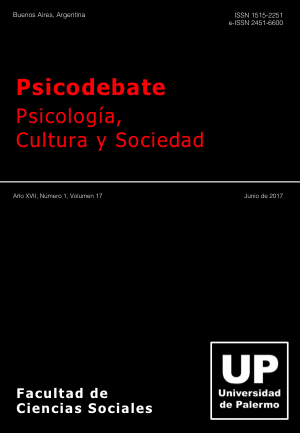Organizational Virtues, Performance and Job Satisfaction. Differences according individual and organizational factors in Argentinean employees
Abstract
This study is based on Positive Organizational Scholarship (POS). That perspective tries to integrate classical organizational studies –which only analyze the negative conditions– with a perspective that visualizes positive variables that contribute to obtain optimal results (Cameron & Spreitzer, 2012). The present study aimed to find differences in organizational virtues (Support and respect, Meaning and inspiration, Forgiveness), according personal (e.g. position) and organizational variables (e.g. size and type of company). Also, it was sought if exist relation between organizational virtues and outcomes measures (organizational / individual performance and job satisfaction). The sample consisted of 569 Argentinean employees (288 men, 281 women); average age: 36.85 years (SD = 11.7); belonging to public companies (18.1%, n = 103) and private companies (81.9%, n = 466). Most of them lived in Buenos Aires and surrounding areas (96.8%, n = 545). For data collection was used: Organizational virtues Inventory –IVO– and surveys designed ad-hoc: socio-demographic, organizational, job satisfaction, organizational and individual performance Surveys. Using univariate analyzes, it was concluded that older people and those in a leadership position have higher levels of Meaning and inspiration. Also, in large and non-stereotypical companies, lower levels of Support and respect were perceived. All virtues correlated significantly with measures of performance and satisfaction.
Downloads
References
Balzer, W. K., Kihm, J. A., Smith, P. C., Irwin, J. L., Bachiochi, P. D., Robie, C.,... Parra, L. F. (1997). User’s manual for the Job Descriptive Index (JDI; 1997 Revision) and the Job in General (JIG) Scales. Bowling Green, OH: Bowling Green State University.
Bright, D. S., Cameron, K. S., & Caza, A. (2006). The Amplifying and Buffering Effects of Virtuousness in Downsized Organizations. Journal of Business Ethics, 64, 249–269. https://doi.org/10.1007/s10551-005-5904-4
Cameron, K. S., Brigth, D., & Caza, A. (2004). Exploring the relationship between organizational virtuosness and performance. American Behavioral Scientist, 47(6), 1-24. https://doi.org/10.1177/0002764203260209
Cameron, K. S., Mora, C., Leutscher, T., & Calarco, M. (2011). Effects of positive practices on organizational effectiveness. The Journal of applied Behavioral Science, 47, 266-308. https://doi.org/10.1177/0021886310395514
Cameron, K. S. & Spreitzer, G. M. (2012). What is positive about Positive Organizational Scholarship? En K. S. Cameron & G. M. Spreitzer (Eds.), The Oxford Handbook of Positive Organizational Scholarship (pp. 1-14). New York: Oxford University Press.
Cameron, K. S. & Winn, B. (2012). Virtuousness in Organizations. In: K. S. Cameron & G. M. Spreitzer (Eds.), The Oxford Handbook of Positive Organizational Scholarship (pp. 231-243). New York: Oxford University Press.
Cohen, J. (1992). A power primer. Psychological Bulletin, 112(1), 155-159. https:// doi.org/10.1037/0033-2909.112.1.155
Dutton, J. E. & Glynn, M. (2007). Positive Organizational Scholarship. En C. Cooper & J. Barling (Eds.), Handbook of organizational behavior. Thousand Oaks, CA: Sage.
Fineman, S. (2006). On being positive: Concerns and counterpoints. Academy of Management Review, 31, 270-291. https://doi.org/10.5465/ AMR.2006.20208680
Judge, T. A., Thorensen, C. J., Bono, J. E., & Patton, G. K. (2001). The job satisfaction-job performance relationship: A qualitative and quantitative review. Psychological Bulletin, 127, 376-407. https://doi.org/10.1037/0033- 2909.127.3.376
Lupano Perugini, M. L. (2014). Organizaciones Positivas: un marco de referencia para su abordaje en Latinoamérica. Acta Psiquiátrica y Psicológica de América Latina, 60(4), 277-284.
Lupano Perugini & Castro Solano, A. (2016). Perfiles de organizaciones positivas. Análisis de características percibidas según variables individuales, organizacionales y de resultado. Escritos de Psicología, 9(2), 1-11. https://doi. org/10.5231/psy.writ.2016.1103
Lupano Perugini, M. L. & Castro Solano, A. (2017a). Influencia de las Virtudes Organizacionales sobre la performance laboral. Un estudio en organizaciones argentinas. Interdisciplinaria, en prensa.
Lupano Perugini, M. L. & Castro Solano, A. (2017b). Virtudes organizacionales y características positivas asociadas a performance y satisfacción laboral. Acción Psicológica, en prensa.
Park, N. & Peterson, Ch. (2003). Virtues and organizations. En K. S. Cameron, J. E., Dutton, & R. E. Quinn (Eds.), Positive organizational scholarship: Foundations of a new discipline (pp. 33-47). San Francisco: Berrett-Koehler.
Peterson, Ch. (2006). Enabling Institutions. En Ch. Peterson (Ed.), A primer in Positive Psychology (pp. 275-304). New York: Oxford University Press.
Peterson, C. & Seligman, M. E. P. (2004). Character strengths and virtues: A handbook and classification. New York, NY, US: Oxford University Press. REFERENCIA NO CITADA
Quinn, R. (2015). The Positive Organization: Breaking Free from Conventional Cultures, Constraints, and Beliefs. Oakland: CA: Berrett-Koehler. https://doi. org/10.5848/bk.978-1-62656-563-0_3
Salanova, M., Llorens, S., & Martínez, I.M. (2016). Aportaciones desde la Psicología Organizacional Positiva para desarrollar organizaciones saludables y resilientes. Papeles del Psicólogo, 37(3), 177-184.
Siedel, G. J. (2016). The three pillars Model for Business Decisions. Michigan: Van Rye Publishing, LLC.
Spector, P. E. (1997). Job Satisfaction: Application, Assessment, Causes, and Consequences. United Kingdom: Sage Publications Ltd.
Weiss, H. M. & Brief, A. P. (2001). Affect at work: A historical perspective. In: R. L. Payne & C. L. Cooper (Eds), Emotions at Work: Theory, Research, and Applications for Management (pp. 133–172). Chichester, UK: Wiley.
Authors who publish with this journal agree to grant Psicodebate copyright and right of publication and accept the work being licensed under a Creative Commons Attribution License that allows others to share the work with an acknowledgement of the authors and Psicodebate.

















